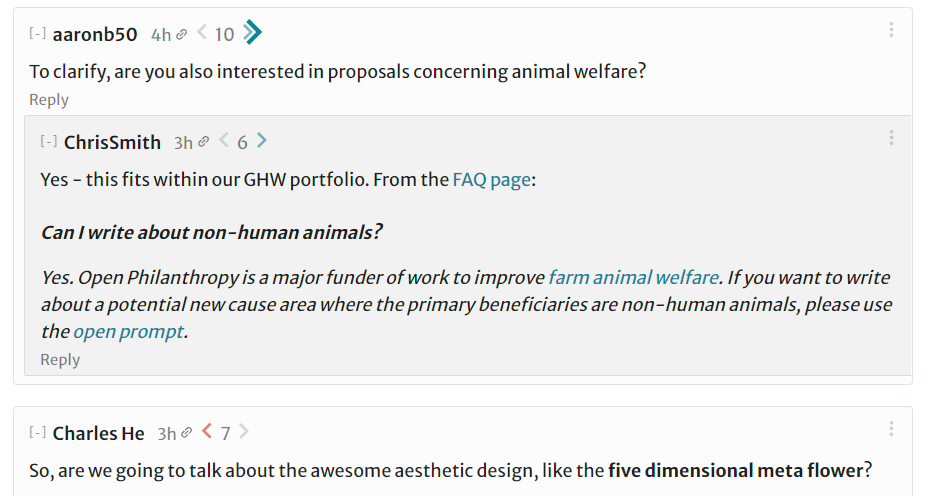At Open Philanthropy, we aim to give as effectively as we can. To find the best opportunities, we’ve looked at many different causes, some of which have become our current focus areas.
Even after a decade of research, we think there are many excellent grantmaking ideas we haven’t yet uncovered. So we’ve launched the Cause Exploration Prizes around a set of questions that will help us explore new areas.
We’re most interested in responses to our open prompt: “What new cause area should Open Philanthropy consider funding?”
We also have prompts in the following areas:
We’re looking for responses of up to 5,000 words that clearly convey your findings. It’s fine to use bullet points and informal language. For more detail, see our guidance for authors. To submit, go to this page.
We hope that the Prizes help us to:
- Identify new cause areas and funding strategies.
- Develop our thinking on how best to measure impact.
- Find people who might be a good fit to work with us in the future.
You can read more about the Cause Exploration Prizes on our dedicated website. You’ll also be able to read all of the submissions on the Effective Altruism Forum later this summer – stay tuned!
Prizes, rules, and deadlines
All work must be submitted by 11:00 pm PDT on August 11, 2022 (deadline extended on July 28) August 4, 2022.
You are almost certainly eligible. We think these questions can be approached from many directions; you don’t need to be an expert or have a PhD to apply.
There’s a $25,000 prize for the top submission, and three $15,000 prizes. Anyone who wins one of these prizes will be invited to present their work to Open Phil’s cause prioritization team in San Francisco (with compensation for time and travel). And we will follow up with authors if their work contributes to our grantmaking decisions!
We will also award twenty honorable mentions ($500), and a participation award ($200) for the first 200 submissions made in good faith and not awarded another prize.
All submissions will be shared on the Forum to allow others to learn from them. If participants prefer, their submission can be published anonymously, and we can handle the logistics of posting to the Forum. See more detail here.
For full eligibility requirements and prize details, see our rules and FAQs.
If you have any questions not answered by that page, contact us at hello@causeexplorationprizes.com.
View submissions
You can use the Cause Exploration Prizes tag to see published submissions.





https://causeexplorationprizes.com/guidance
This link is not working for me
It's working now, thanks.